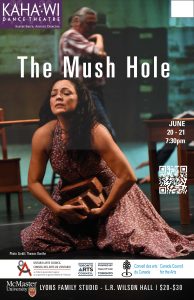‘Finding light in dark places’ — The Mush Hole to be performed on campus

The Faculty of Humanities is hosting two performances of the award-winning work created by artist and McMaster Chancellor Santee Smith. (Photo by Thomas Boethe))
On June 20 and 21, McMaster’s Faculty of Humanities will host two performances of The Mush Hole, a theatrical dance production created by internationally recognized multidisciplinary artist and McMaster chancellor Santee Smith.
The work, directed, produced and performed by Smith, along with the Kaha:wi Dance Theatre, reflects the harsh realities — and brutalities — of the Mohawk Institute, Canada’s first residential school.
Operating in Brantford, Ontario from 1828 to 1970, the Mohawk Institute was a key tool of assimilation and cultural destruction for First Nations children from Six Nations of the Grand River and other communities in Ontario and Quebec, leading to a legacy of profound intergenerational trauma for approximately 15,000 Indigenous children and their families.
Using embodied storytelling and multimedia design, The Mush Hole draws on testimonials from two generations of survivors to create a visceral, authentic portrayal of their experiences.
“The Mush Hole moves through the devastation of residential school with grace and hope for transformation and release,” Smith says in materials she wrote to accompany the performances.
“Opening a small window into the atrocities inflicted on thousands of Indigenous children, it attempts to close the door on historical amnesia.”
Smith, whose Haudenosaunee name, Tekaronhiáhkhwa, means “picking up the sky,” is a two-time McMaster graduate, holding degrees in physical education and psychology along with a Master of Arts in dance from York University. She became McMaster’s 19th chancellor in 2019, and is from the Kahnyen’kehàka (Mohawk) Nation, Turtle Clan from Six Nations of the Grand River.
Smith was appointed to the Order of Canada in 2023.

The Mush Hole will be performed in the newly named Lyons Family Studio in McMaster’s L.R. Wilson Hall.
The studio, which is a black box-style theatre with advanced lighting, digital sound and projection capabilities, allows for extensive flexibility and creativity in staging performances.
Following the performance on Thursday, June 20, there will be a Q & A session led by Bernice Downey, the inaugural associate dean of Indigenous health and an associate professor in McMaster’s Faculty of Health Sciences.
After the performances at McMaster, The Mush Hole will also be presented at venues in Rochester and Albany, NY.
“The residential school legacy and ongoing institutionalized erasure of Indigenous lives and culture is an issue that affects all Canadians,” says Smith.
“Through specificity, we find universality. The Mush Hole is a story about hope and finding light in dark places. As much as it speaks to intergenerational trauma it screams resilience.”
Show dates, time and location
Thursday, June 20, 7:30 p.m. (with Q and A led by Bernice Downey)
Friday, June 21, 7:30 p.m.
Lyons Family Studio, L.R. Wilson Hall, McMaster Main Campus

